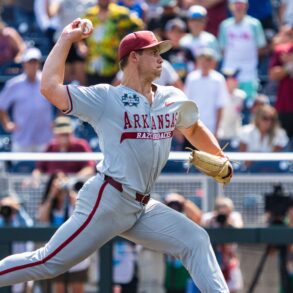
Grant Halverson/NCAA Photos via Getty Images
The legal battle between Vanderbilt quarterback Diego Pavia and the NCAA could have major ramifications for college baseball, minor league baseball and Major League Baseball.
A federal judge’s decision to grant an injunction in Pavia’s lawsuit against the NCAA—which is centered on Pavia’s argument that time spent at a junior college shouldn’t count against a player’s NCAA eligibility and violates antitrust law—could result in college baseball players stretching out their eligibility for an extended period, as ESPN’s Kiley McDaniel reported on Monday:
“The feedback I got from MLB scouts and college coaches on what this means for four-year schools showed the ramifications would also be felt all the way up to the highest levels of Division I baseball. The top schools would have rosters featuring a mix of top draft prospects of a typical college age and ‘professional’ collegiate players in their mid-to-late-20s, with the latter shuffling in and out nearly every season.
“In fact, a scout texted me the Pavia headline and added: ‘The NCAA just got a minor league.’ I texted back to clarify, ‘The SEC will just be big draft guys and 26-year-olds?’ ‘Pretty much.'”
McDaniel laid out one possible scenario: A player redshirts as a true freshman, spends two seasons at a junior college and then has four seasons of eligibility after that, with the potential to earn a nice NIL package. And that doesn’t include other options such as a postgrad year or a medical redshirt year.
Players in such a scenario also have incredible flexibility when deciding to turn pro, with McDaniel noting that “MLB rules allow players to be drafted after each season at a junior college or in a college season where they turn 21 years old by Aug. 1.”
Under the current system, players generally have to wait three season if they go the college route before they can sign with a pro team. The junior college scenario would bypass that restriction.
Obviously the very top prospects will either sign with an MLB team immediately or jump right to a Power 4 program. But it’s very possible that we could see college baseball players sticking around into their late 20s if the injunction in the Pavia case is upheld.
That, in turn, could alter how teams approach the MLB draft and could have an impact on the minor leagues. A lot of folks in baseball are likely monitoring the Pavia case with a huge degree of interest, in other words.
This post was originally published on this site be sure to check out more of their content.





